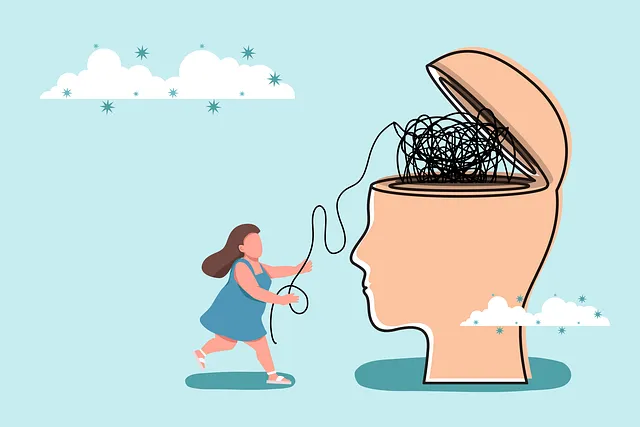Kaiser Permanente mental health Westminster prioritizes culturally sensitive care through comprehensive training and specialized programs. By understanding diverse cultural backgrounds, beliefs, and values, healthcare providers ensure tailored support for patients' unique needs, enhancing outcomes and building trust. Strategies like Compassion Cultivation Practices, Conflict Resolution Techniques, and Tailored Stress Reduction Methods foster inclusive care, addressing cultural differences and communication barriers effectively.
Cultural sensitivity is a cornerstone of effective mental healthcare, especially within diverse communities like those served by Kaiser Permanente in Westminster. This article explores the importance of cultural sensitivity in mental healthcare practice, drawing from Kaiser Permanente’s approach as a leader in cultural competence. We delve into practical strategies for mental health professionals to navigate cultural differences, enhancing services tailored to the unique needs of Kaiser Permanente’s diverse patient population in Westminster.
- Understanding Cultural Sensitivity: A Foundation for Effective Mental Healthcare in Westminster
- Kaiser Permanente's Approach to Cultural Competence: Enhancing Services for Diverse Communities
- Practical Strategies for Mental Health Professionals: Navigating Cultural Sensitivity in Clinical Practice at Kaiser Permanente, Westminster
Understanding Cultural Sensitivity: A Foundation for Effective Mental Healthcare in Westminster

In Westminster, cultural sensitivity is a cornerstone for delivering effective mental healthcare services, as recognized by organizations like Kaiser Permanente mental health Westminster. Understanding and respecting diverse cultural backgrounds, beliefs, and values are essential to ensuring every patient receives care tailored to their unique needs. This approach not only improves outcomes but also fosters trust and builds stronger relationships between healthcare providers and patients from various ethnic, racial, and cultural origins.
The integration of cultural sensitivity goes beyond basic awareness; it involves providing comprehensive training for healthcare providers, including Crisis Intervention Guidance and Healthcare Provider Cultural Competency Training. These programs equip professionals with the skills to navigate complex cultural dynamics, enabling them to offer sensitive support for issues like Self-Esteem Improvement and effectively address mental health concerns within their respective communities.
Kaiser Permanente's Approach to Cultural Competence: Enhancing Services for Diverse Communities

Kaiser Permanente, a leading healthcare organization, places significant emphasis on cultural sensitivity within its mental health services, particularly in diverse communities like Westminster. Their approach to cultural competence is multifaceted and deeply ingrained in their mission to provide equitable care. By recognizing the unique needs and experiences of different cultural backgrounds, Kaiser Permanente ensures that its mental health services are accessible and effective for all.
This organization offers specialized programs tailored to address specific cultural challenges in mental healthcare. For instance, they provide resources for Depression Prevention and Emotional Regulation among diverse populations, ensuring that treatments are culturally relevant. Kaiser Permanente also prioritizes Healthcare Provider Cultural Competency Training, empowering staff to offer sensitive and informed care. Through these initiatives, they aim to bridge gaps in mental health services, foster trust with diverse communities, and ultimately improve the overall well-being of their patients in Westminster and beyond.
Practical Strategies for Mental Health Professionals: Navigating Cultural Sensitivity in Clinical Practice at Kaiser Permanente, Westminster

Mental health professionals at Kaiser Permanente Westminster recognize that providing culturally sensitive care is paramount to building trust and effective treatment plans. To navigate this critical aspect, they employ practical strategies such as Compassion Cultivation Practices, which foster understanding and empathy towards diverse patient backgrounds. By cultivating a deep sense of compassion, healthcare providers create safe spaces for individuals to share their unique experiences and perspectives.
Additionally, Conflict Resolution Techniques are integrated into clinical practice to address cultural differences and potential communication barriers. These techniques enable professionals to navigate sensitive conversations with finesse, ensuring that every patient feels heard and respected. Equally important are Stress Reduction Methods tailored to the specific needs of diverse populations. Through these practices, mental health experts at Kaiser Permanente Westminster enhance patient well-being and promote holistic healing within a culturally inclusive framework.
In conclusion, integrating cultural sensitivity into mental healthcare practice, as demonstrated by Kaiser Permanente’s approaches and strategies in Westminster, is paramount for providing effective support to diverse communities. By fostering cultural competence, mental health professionals can create inclusive environments, improve patient outcomes, and build stronger connections within these communities. This article has explored the importance of understanding cultural nuances, offered insights from Kaiser Permanente, and provided practical tools for navigating cultural sensitivity, all of which contribute to enhancing mental healthcare services for all.






